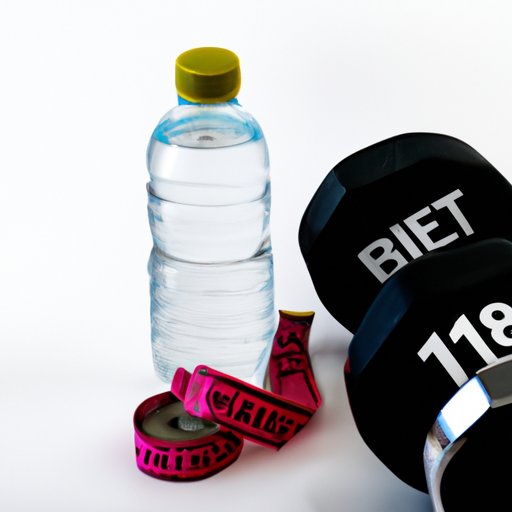
Introduction
Water weight, also known as fluid retention or edema, refers to the excess amount of fluid that has built up in the body’s tissues. It’s not uncommon for individuals to experience fluctuations in water weight depending on the day, time of day, and a variety of other factors. However, when it becomes excessive, water weight gain can lead to uncomfortable side effects such as bloating, swelling, and weight gain. It can also be a sign of a more serious health issue. In this article, we’ll explore what causes water weight, how to shed excess pounds, and optimize your athletic performance through proper hydration.
Why You Might Be Carrying Extra Water Weight and How to Shed It
There are several reasons why you might be carrying extra water weight. One common cause is a high salt intake, which can cause your body to retain water. Dehydration can also cause water weight gain, as your body will try to hold onto as much fluid as possible. Hormonal changes, such as those experienced during menstruation or pregnancy, can also lead to water weight gain. Additionally, certain medications, such as those for blood pressure or steroid hormones, may cause fluid retention as a side effect.
To reduce excess water weight, it’s important to increase your water intake, as this will help flush out excess fluids. Reducing your sodium intake can also be beneficial, as salt encourages your body to hold onto water. Incorporating exercise into your routine can also help shed excess water weight as you sweat and expel fluids. Additionally, natural diuretics such as dandelion root, horsetail, and green tea can help flush out excess fluids.
The Truth About Water Weight: How Much is Normal and When to Be Concerned
Normal water weight can fluctuate and it varies from person to person. Generally, a healthy adult may carry between 5-10 pounds of water weight, but it can increase with various factors such as diet, weather, and activity levels. However, when water weight becomes excessive and interferes with daily activities or quality of life, then it can be a sign of a more serious health issue. Major health conditions such as heart problems, kidney disease, or liver problems can cause fluid retention and it’s important to consult with your healthcare provider if you experience water weight fluctuation that seems abnormal.
10 Foods That Reduce Water Retention in the Body
Natural diuretics can be found in certain foods and drinks and they can help reduce water retention. These include fruits such as watermelon and berries, vegetables like cucumbers, carrots and asparagus, and tea made from parsley or green tea. Many of these foods can be easily incorporated into your diet, making it easier to manage water weight fluctuations. Reducing processed foods, which can be high in sodium, can also be helpful in reducing water weight gain.
The Science of Water Weight: How it Affects Exercise Performance
Water weight can significantly affect athletic performance. Dehydration can result in decreased performance, while overhydration can lead to feeling bloated and sluggish. It’s important to pay careful attention to hydration levels before, during, and after exercise. Proper hydration is essential for optimal performance, so make sure to drink fluids before, during, and after exercise.
My Weight Loss Journey: How I Lost XX Pounds of Water Weight in Just One Week
While results may vary, it is possible for people to lose excess water weight in a short period of time. One person may have shed up to 8-10 pounds in one week by cutting out processed foods, increasing their water intake, and incorporating natural diuretics such as herbal teas and cranberry juice. It’s important to remember that rapid weight loss might not be sustainable or healthy in the long term, so always consult with your healthcare provider and focus on slowly and holistically losing weight.
Conclusion
Water weight, while often temporary, can be uncomfortable and even a sign of a more serious health issue. However, with proper management and attention, you can shed excess water weight and optimize your athletic performance safely and naturally. By incorporating healthy dietary habits, increasing your water intake, and monitoring hydration levels, you can achieve your weight loss and fitness goals. If you experience significant or prolonged water weight fluctuation, consult with your healthcare provider.




